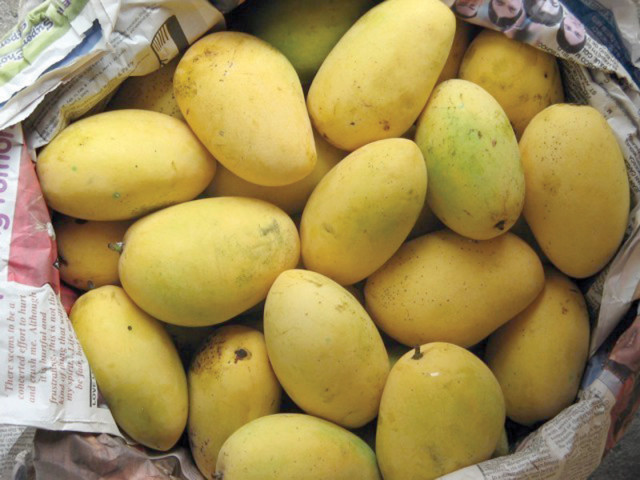Quality control: EU markets proving to be a tough nut for Pakistani exporters
Difficult for mangoes to make their way into EU, decline expected in exports this season

This year, Pakistan has found it tough to export its fruits and vegetables to the European Union (EU). Strict monitoring against fruit flies and the EU-imposed ban on Indian mangoes put Pakistan to the sword as well.
It has re-taught a valuable lesson to the country – to continue reaping the benefits, one has to invest in technology. Experts and leading fruit and vegetable exporters have pointed out several technologies Pakistan could opt to invest in if it is serious about sustaining its export level to the EU.
“Whatever success Pakistani exporters have got this year is because of past investment made in Hot Water Treatment (HWT) plants in Karachi,” said Abdul Qadir Khan, chairman at Durrani Associates – the firm that processed most of this year’s mango exports for the EU. “If we’re looking to increase our exports, the investment needs to be made continuously in these plants.”
Pros and cons
The technology is decades old but is much cheaper compared to other modern methods including irradiation and vapour heat treatment (VHT). Most importantly, high-end and profitable markets like the EU and Australia find this technology acceptable and can assist the country in penetrating these markets.
A normal HWT plant costs between Rs2.5 million to Rs5 million, while an average cost of an irradiation plant is a staggering Rs200 million to Rs250 million.
“Looking at the weak financial position of Pakistani exporters, HWT technology needs to be opted for, especially to tap the EU market, which accepts HWT treated fruits and vegetables,” said Pakistan Fruit and Vegetable Exporters, Importers and Merchant Association (PFVA) Co Chairman Waheed Ahmed.
Despite the fact that the HWT plants are one of the cheapest options available, the country has failed to invest the appropriate amount in this technology. As a consequence, Pakistan had few HWT plants to counter the threat to its exports when the EU warned of a possible ban if quality control was not maintained.
HWT facilities are mostly present in Karachi, troubling exporters from Punjab and even northern Sindh in sending their goods to the provincial capital.
Fewer markets available
Failing to meet the EU standards, exporters and growers from Punjab had to target Middle Eastern markets.
“Strict checking for the EU has caused a severe decline in mango exports this year, hurting exporters from Punjab the most,” said Ahmad Jawad, director at Harvest Tradings, a fruit exporting and consultancy firm in Islamabad.
Exporters, however, insist that the country can overcome the troubles if it starts preparations for next season.
“Pakistan can increase its exports if its private sector starts investing in HWT and dip technologies. What’s encouraging is that a lot of HWT plants are going to be set up in the next few months in Multan and other cities in Punjab to cater to the EU markets,” Jawad added.
Despite several reasons to invest in HWT plants, some exporters believe Pakistan should invest in other technologies. But, these are people who have the next few decades in mind.
“HWT is a technology that is at least 50 years old,” said Farm House Export Director Naveed Nadir. His firm made the first commercial mango export to the US this season.
“I think Pakistani exporters should opt for irradiation so that they can not only cater to the EU markets but also export to the US, which is considered one of the toughest to penetrate in because of its strict rules and protocols.”
This season
The current mango season is about to end and exporters have already painted a bleak picture, saying that a record decline is expected. However, those who managed to export have earned more than double profits.
With the EU issuing a stern warning to Pakistan that it will face the same fate as India if more than five of its shipments are found contaminated, exporters have their work cut out.
It is important to note that last year EU authorities found 234 Pakistani mango shipments to be contaminated, prompting the tough stance this time around.
Realising the repercussions, the Pakistani government have decided to raise the standards, even if it means a lower level of exports this year.
Despite the quality control methods implemented, two consignments were still found to be contaminated, prompting HWT to be made compulsory for all exports.
The time is now for Pakistan to invest in technology and ensure the quality control international markets expect. Otherwise, exporters would be left to rue this very moment when they decided to slack off.
Published in The Express Tribune, October 13th, 2014.
Like Business on Facebook, follow @TribuneBiz on Twitter to stay informed and join in the conversation.



















COMMENTS
Comments are moderated and generally will be posted if they are on-topic and not abusive.
For more information, please see our Comments FAQ